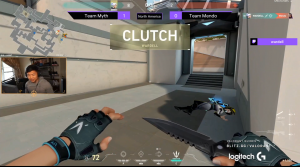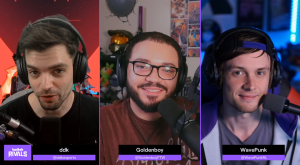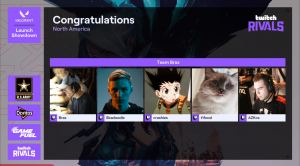Twitch Rivals Gives Valorant a Grand Debut With ‘Launch Showdown’ Global Esports Tournament
A mix of at-home and traditional workflows across eight regions was deployed for the event
Story Highlights
After months of eager anticipation by the gaming community, Riot Games’ latest title, Valorant, finally arrived on June 2. In celebration of the launch, Twitch and Riot Games hosted the $200,000 Twitch Rivals Valorant Launch Showdown, featuring eight Valorant tournaments taking place simultaneously in eight global regions June 3-7. To pull this off, the Twitch Rivals production-operations team created a transcontinental model that deployed multiple crews and blended at-home and traditional workflows.

Twitch Rivals’ entire home-base control-room team in North America worked remotely from their respective homes for the Valorant Launch Showdown.
“Our workflow has been in place for at-home production for some time. The size and scope of the event and collaboration between multiple regions globally made this unique,” says Steven Flisler, senior director, esports product and operations, Twitch. “The Twitch team also had been in talks with Riot about this show for many months, [from] the big closed beta event in April all the way to the June launch. The curveball was working in the current climate given work from home conditions.”
Production Model: Around the Clock, Around the World
The Twitch Rivals production-ops team led by Mitch Rosenthal was staffed around the clock with Twitch crew members across the globe. The team divided the tournaments across North America, Latin America, Europe, and Asia and engaged three of its production partners — Vindex/NGE (Next Generation Esports), Freaks4U, and OGN — to help run the local tournaments and seven local-language broadcasts. Twitch Rivals’ home-base remote-control-room team orchestrated 43 hours of coverage June 5-7 as well as a kickoff show on June 3.
“This was a little bit different given the hours and number of active regions,” says Flisler. “Following the sun and having our partners upload highlights and stats so we could tell a global story was a first for us at this scale. Other than our TwitchCon events that feature two or three days of constant programming, this was our largest series of events and by far our largest endeavor for online production.”
The combination of at-home and traditional control-room–based production workflows depended on the location. Productions out of Asia and Europe (Korea and Germany), for example, were able to deploy physical infrastructure (while maintaining social-distancing regulations). In North America (specifically Los Angeles), Twitch deployed a modified remote setup given pandemic restrictions. Each team was 15-20 people depending on the region, with talent located remotely across the world regardless of region.
Twitch Rivals’ primary production partner, Vindex/NGE, managed the core production on Twitch.tv/TwitchRivals, built the global graphics package, and handled the live kickoff stream, as well as the North American, Brazil, and LATAM tournaments. In Europe, Twitch Rivals partnered with Freaks4U for the two tournaments and the English-, German-, and French-language feeds. In Asia, OGN ran the Korea and Japan tournaments and local-language streams.
“We rely on our partners globally to work with our internal team to pump out amazing content for our viewers,” says Flisler.
In addition, Twitch worked to create as much synergy as possible between its Events and Broadcast teams with Events Manager Matthew Lamos working hand in hand with Broadcast Production Manager Alex Solomita.
“That really helped smooth out the logistics of an event this large,” says Flisler. “The collaboration was the key to the success of this event. Having synergy between them is a testament to our internal team’s ability to bring it all together.”
Player Coordination and Broadcast: 360 Participants, Seven Languages
The Twitch Rivals Valorant Launch Showdown featured 360 participants across eight tournaments in seven languages. Sourcing these streamers to participate in the global launch event proved to be a major undertaking, so Twitch Rivals worked closely with Riot Games to ensure that the best of the best were able to participate.
“Coordinating the logistics of 360 players across eight regions was the most challenging and rewarding part of executing a tournament series like this,” says Flisler. “The better we position the players for success, the better the experience will be for both players and viewers. We use a high-touch approach to communicate with our Twitch creators in an event like this and, to ensure a great experience, make sure that everyone is live on-stream well before the competition starts.”
CLICK HERE to watch the Valorant Launch Showdown Finals.
The spectating presentation of the game also presented a major challenge because Twitch aimed to cut between player-streamer POV cameras, observer first-person perspectives, and observer third-person perspectives. All these sources had to be in sync, and, with stream delays to keep the tournament competitive, the operations team was faced with even more variables to triangulate.
“[We produced] five days of content [with] skrimming [scrimmaging] and high-level competition for a brand new game,” says Flisler. “It’s a massive win for Riot and Twitch and, most important, the Twitch community. The climax of the competition lasted all the way until the 43rd broadcast hour.”
Twitch Rivals Mission: Keep the Community Engaged
Though marking a high-point for Twitch Rivals, the Valorant Launch Showdown is just one of nearly a dozen live esports broadcasts during the coronavirus pandemic lockdown — largely produced via fully remote workflow.

The Twitch Rivals event served as the coming-out party for Valorant, one of the most anticipated new games in recent memory.
“Now that we have completed over three months of remote broadcasts, our workflows are becoming more norm than exception,” says Flisler. “Remote comms, virtual front and back benches to control rooms, and simplified technical workflows for remote talent are becoming essential for success.”
Twitch Rivals has worked to keep its community engaged during the lockdown with events featuring Rainbow Six, FIFA20, Rocket League, DOTA 2, Call of Duty: Warzone Legends of Runterra, Fortnite, Escape From Tarkov, as well as Valorant.
“Above all else, Twitch is a place to build community by interacting with and around shared passions like esports,” says Flisler. “Now more than ever, people are looking online and to Twitch for connection. We are pleased to foster an environment that mimics real-life gatherings, which our community has enjoyed since Twitch’s inception, and give Valorant a place to build their fanbase most effectively from the start.”


